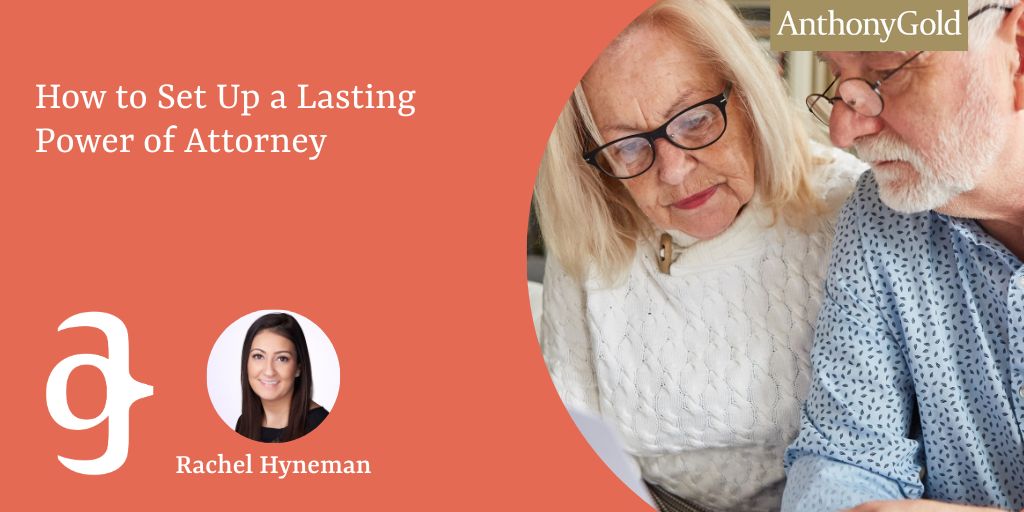How to Set Up a Lasting Power of Attorney

A key part of financial planning, as well as planning for later life, is appointing a lasting power of attorney (LPA). This is the person, or persons, that you will entrust with making important decisions on your behalf in the event that you lack mental capacity to do so yourself. You can appoint separate LPAs for your financial affairs, and decisions relating to your health and wellbeing, or choose the same attorneys to look after both.
Although setting up an LPA is so vital, the process can be daunting. Our expert Court of Protection team have compiled this handy guide to help you to understand each of the steps required to successfully set up a lasting power of attorney.
Who should I appoint to be my Attorney?
Before you begin the process of setting up an LPA, it’s essential that you understand that the LPA will only be valid if you are 18 or over and able to make decisions yourself at the time the LPA is set up (i.e. you have “mental capacity”). You must have entered into the LPA of your own free will and not been pressurised by someone to sign it. You must be able to trust the person you appoint on your behalf (your “attorney”) to act in your best interests, since they will be making very important decisions about your life.
You can choose one or more people to be your attorney. Like you, they must be over 18 and have mental capacity. You may decide to appoint a relative, friend, or a professional, such as a solicitor. They do not have to be resident in the UK or be a British Citizen.
Before choosing your attorney, it is important to think about the following:
- Are they well-organised, and how good are they with their own affairs?
- How well do you know them?
- Do you trust that they would make decisions which are in your best interests?
- Would they be happy to make decisions on your behalf if they had to?
It is a good idea to speak with the person, or people, you wish to appoint, and discuss with them the responsibilities they will have as your attorney.
You can appoint more than one person to be your attorney, but you will need to decide how they will make decisions. They can be appointed ‘jointly’ so all decisions must be made together. Or they can be appointed ‘jointly and severally’ which means decisions can be made on their own or together (often seen as more practical). You can also appoint one person to be responsible for decisions related to your health and welfare, and another to manage your financial affairs and assets. However, you may select the same person for both roles if you wish.
There is the option to nominate replacement attorneys too. This is something that we encourage younger clients to do, if their LPA is their parent or guardian. In the event that they are similarly incapacitate and unable to fulfil the duties of an LPA, we’d always recommend having a replacement attorney legally specified. You should also be sure to keep your LPA updated, alongside your will, to ensure that your affairs will be managed by the right person, at the right time (for instance, your spouse if you are married, or a new partner if you divorce).
How to set up a Lasting Power of Attorney in 7 Steps
Once you have appointed your attorney, or attorneys, there is a specific legal process which must be followed in order to make sure the LPA is legally binding.
To set up the LPA, you need to do the following:
- Choose your attorney(s)
- Decide whether you need a personal welfare LPA and/or a property and financial affairs LPA.
- Complete the standard LPA form(s) to appoint your attorney(s).
- You need to ensure that you and your attorney(s) and relevant witnesses have signed the form(s). The LPA must be signed by a certificate provider who confirms that you understand it and haven’t been put under pressure to sign it. This must be someone you know well or a professional person, such as a doctor, social worker or solicitor.
- You need to complete form LP3 to notify the people you have listed in the LPA as needing to be told that you plan to register the LPA. They have three weeks to raise any concerns with the Office of the Public Guardian (OPG).
- Apply to register your LPA with the OPG. This can take up to 10 weeks. If you do not register your LPA, your attorney will not be able to make decisions on your behalf. Your attorney can register the LPA for you if you wish.
- When registering your LPA, you need to pay a fee unless you are entitled to a reduction or exemption. The current fee is £110 to register each LPA. You may be entitled to a reduction or exemption if you are on means tested benefits, or you have a low income.
Although the process to set up an LPA may seem long and complicated, it’s essential that each step is followed to ensure that your LPA has the legal right to make decisions on your behalf. If the LPA is incomplete and hadn’t been registered correctly, it may be challenged and result in difficult situations such as the correct medial care not being provided, or individuals fraudulently claiming your assets.
In order to make sure your LPA has been correctly administered, we would always recommend consulting with a legal expert in Lasting Powers of Attorney. Contact a member of our team via our website, and we’ll be in touch shortly to discuss your situation and advise you on your LPA.
Applying to Register your Lasting Power of Attorney
Once you have chosen who you wish to appoint as your attorney and possibly replacement attorney, you can start the application process.
The application can be made online or using papers forms. Either way, the following people are required to sign the forms in the presence of a witness:
- You, as the donor;
- Your attorneys;
- Your replacement attorneys.
You must also have a ‘certificate provider’ who signs the form to confirm that you are making the Lasting Power of Attorney by choice and that you fully understand what you are doing.
There is a very strict order which the form must be signed in and if this is not followed, the court will reject the application.
There are optional sections where you can notify people you are making the application. If they have any concerns, they have a certain time period to raise them with the court. It is better to resolve any issues or concerns prior to the Lasting Power of Attorney being registered.
You can also include instructions and preferences for your attorneys about how you would like your affairs to be handled.
Registering a Lasting Power of Attorney
Once the application is complete, it must be sent to the Office of the Public Guardian (the court) to be registered.
You can apply to register it if you are able to make your own decisions. If your attorney applies on your behalf, the court will notify you so that you can object to the application if you wish to.
It takes between 8 and 10 weeks for the court to register the Lasting Power of Attorney. However, this may vary depending on how many recent applications have been made.
If you have chosen to notify people of the application, they must be told before registration, and they will have 3 weeks to raise any concerns.
The court fee for each Lasting Power of Attorney is £82 unless you qualify for a reduction or fee exemption.
Once registered, and if you have chosen the option whereby you give consent to your attorney, your attorney can assist with your financial and property affairs right away, if you would like them to. Otherwise, the Lasting Power of Attorney should be kept in a safe place so that it can be accessed by your attorney should you ever lose mental capacity.
Find a Solicitor for your LPA
If you need any help setting up your LPA, or registering it, our Court of Protection team can assist you. It is important to ensure that the form is completed correctly, otherwise, this can result in a delay in your LPA being registered, and you could incur additional fees to correct the mistake. If your circumstances are complicated, it is a good idea to seek legal advice before finalising your LPA. Visit our Contact page to submit an enquiry, and a member of our legal team will be in touch shortly to discuss your options.
For more information about lasting powers of attorney, you can visit our expert guide to the different types of LPA, to help you determine who you should appoint for each role. For more expert-written blog articles and insights, feel free to visit the Anthony Gold blog, for answers to all of your pressing legal questions.
* Disclaimer: The information on the Anthony Gold website is for general information only and reflects the position at the date of publication. It does not constitute legal advice and should not be treated as such. It is provided without any representations or warranties, express or implied.*
